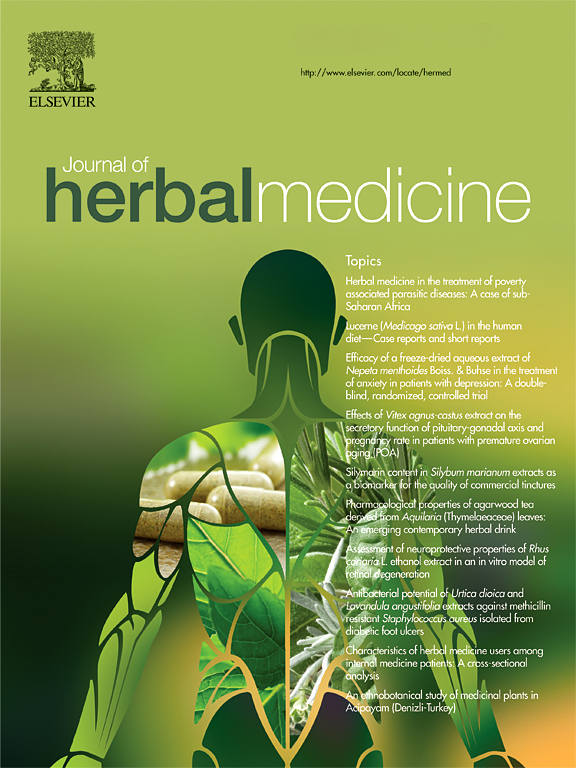京四凉茶通过调节上皮细胞向间质转化和活性氧积累,降低口腔癌细胞的活力、迁移和侵袭能力
IF 1.9
4区 医学
Q2 INTEGRATIVE & COMPLEMENTARY MEDICINE
引用次数: 0
摘要
导言口腔癌是全球第六大常见癌症,如果不在早期诊断和治疗,可能会危及生命。京四凉茶(JSHT)含有八种传统中药材,可抑制多种肿瘤细胞(包括乳腺癌、肺癌和结肠癌细胞)的恶性、生长和转移。在这项研究中,我们评估了 JSHT 通过活性氧(ROS)积累诱导细胞死亡以及抑制迁移、侵袭和上皮细胞向间质转化(EMT)来阻止口腔癌发展的潜力。为此,我们采用了人舌鳞癌细胞株,用不同浓度的 JSHT 处理 24 小时,评估细胞存活率、迁移和伤口愈合能力,并用 Western 印迹法测定 EMT 标记物的表达水平。结果人舌鳞癌人舌鳞癌和 FaDu 人咽鳞癌细胞株的存活率、迁移/侵袭能力、EMT 和 ROS 产生均因 JSHT 处理而降低,其机制与 Lon 蛋白酶无关。本文章由计算机程序翻译,如有差异,请以英文原文为准。
Jing-Si herbal tea attenuates oral cancer cell viability, migration, and invasion by regulating epithelial-to-mesenchymal transition and reactive oxygen species accumulation
Introduction
Oral cancer is the sixth most common cancer worldwide and can be life-threatening if not diagnosed and treated in its early stages. Jing-Si herbal tea (JSHT), containing eight traditional Chinese medicine-based herbs, is known to suppress the malignancy, growth, and metastasis of several tumour cells, including breast, lung, and colon cancer cells. However, the pharmacological effect of JSHT on oral cancer progression is still unclear.
Methods
In this study, we evaluated the potential of JSHT to arrest the development of oral cancer via induction of cell death by reactive oxygen species (ROS) accumulation and inhibition of migration, invasion, and epithelial-to-mesenchymal transition (EMT). For this purpose, we employed the human tongue squamous cell carcinoma human tongue squamous carcinoma cell line, which we treated with different JSHT concentrations for 24 hours, and assessed cell viability, migration, and wound healing capabilities, together with western blotting for measuring expression levels of EMT markers.
Results
Survival, migration/invasion ability, EMT, and ROS production in the human tongue squamous carcinoma human tongue squamous carcinoma and FaDu human pharynx squamous cell carcinoma cell line were decreased by JSHT treatment via Lon protease-independent mechanisms.
Conclusion
This study demonstrates that JSHT could be regarded as a candidate new supplement to existing anticancer therapies and an alternative, orally administered healthcare product for treating oral squamous cell carcinoma.
求助全文
通过发布文献求助,成功后即可免费获取论文全文。
去求助
来源期刊

Journal of Herbal Medicine
INTEGRATIVE & COMPLEMENTARY MEDICINE-
CiteScore
3.90
自引率
0.00%
发文量
94
期刊介绍:
The Journal of Herbal Medicine, the official journal of the National Institute of Medical Herbalists, is a peer reviewed journal which aims to serve its readers as an authoritative resource on the profession and practice of herbal medicine. The content areas of the journal reflect the interests of Medical Herbalists and other health professionals interested in the clinical and professional application of botanical medicines. The objective is to strengthen the research and educational base of herbal medicine with research papers in the form of case studies, original research articles and reviews, monographs, clinical trials and relevant in vitro studies. It also publishes policy statements, opinion pieces, book reviews, conference proceedings and profession related information such as pharmacovigilance reports providing an information source for not only the Herbal Practitioner but any Health professional with an interest in phytotherapy.
 求助内容:
求助内容: 应助结果提醒方式:
应助结果提醒方式:


